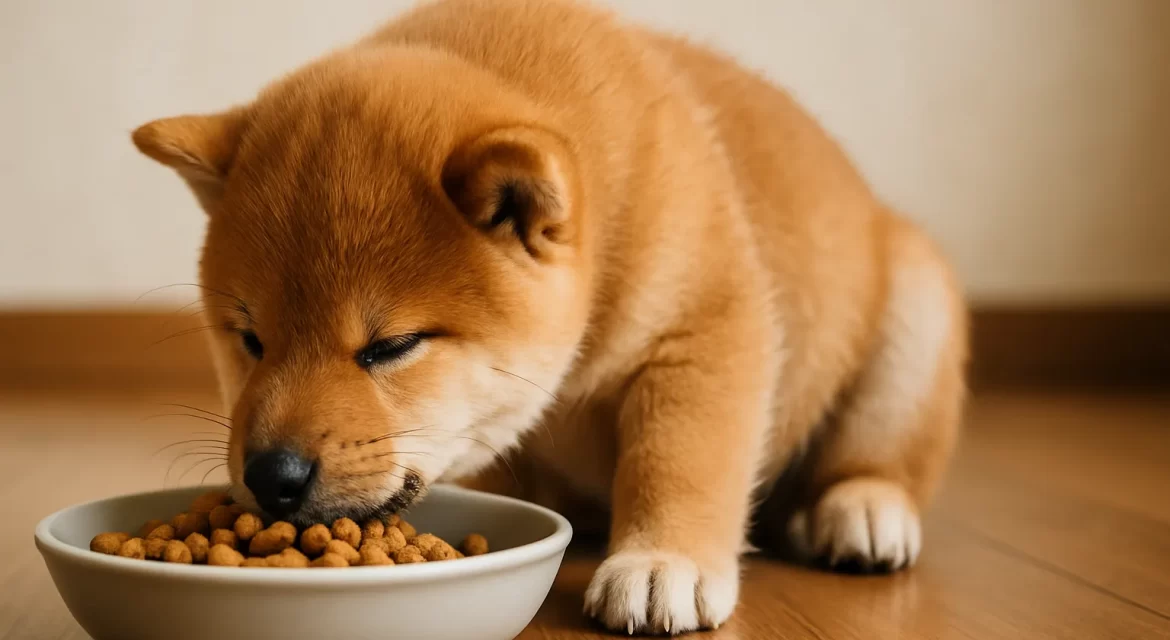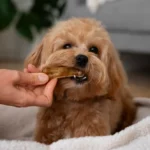As a proud Shiba Inu puppy parent, one of your top priorities is ensuring that your furry friend gets the right nutrition to grow into a healthy, strong adult.
But how do you know what’s best for their tiny yet mighty body? With so many dog food options on the market, it can be overwhelming to choose the best one.
Did you know that choosing the wrong dog food for a Shiba Inu could affect their growth and health in the long run?
Your Shiba Inu needs food that meets their specific dietary needs, based on their age and activity level. Fresh foods, like chicken or fish, provide important protein and is easily digestible. Wet dog food is another great option, especially if your growing Shiba Inu has trouble with dry kibble or needs extra hydration. In this guide, we’ll help you understand what your Shiba Inu needs to eat to stay healthy and happy as they grow.
Why Proper Nutrition Matters for Shiba Inu Puppies?
Shiba Inu puppies are full of energy, curiosity, and cheeky antics. To support their rapid growth and development, they need a balanced diet packed with high-quality nutrients. Poor nutrition can lead to stunted growth, weak bones, digestive issues, or even long-term health problems like allergies or obesity.
Key goals of a healthy diet:
- Promote strong bones and joints
- Support a healthy coat and skin
- Boost immune system function
- Aid brain development and learning
- Maintain ideal weight and muscle tone
What Should Be in a Shiba Inu’s Diet?
Here are the essential components your Shiba Inu dog needs:
1. High-Quality Protein: Shibas thrive on a diet rich in animal protein. Make sure the first ingredient is actual meat, such as fish, cattle, lamb, chicken, or turkey. Protein helps build strong muscles and supports overall development.
2. Healthy Fats: Omega-3 and Omega-6 fatty acids are necessary for Shiba coat luster and healthy skin. Fats also provide long-lasting energy for your pup’s busy day.
3. Complex Carbohydrates: Wholesome grains like brown rice, oats, and barley—or grain-free options like sweet potatoes—offer energy and digestive support.
4. Vitamins and Minerals: Calcium, phosphorus, zinc, and vitamin A support bone health, immune function, and coat quality. Puppies also need DHA for brain development.
15 Best Dog Food For Shiba Inu
1. Chicken (cooked, boneless, skinless)
Chicken is a highly digestible, lean protein that helps your Shiba Inu maintain strong muscles and energy levels. It’s low in fat, making it a great option for dogs with a sensitive stomach or weight management issues. Just make sure to serve it cooked and without any seasoning or bones to avoid any health risks.
2. Salmon (cooked)
Salmon is a fantastic source of Omega-3 fatty acids, which promote a shiny coat and healthy skin, and support joint health. The fish’s oils also help to reduce inflammation, which can benefit older Shiba Inus or those with arthritis. To avoid choking or stomach problems, always serve it cooked and bone-free.
3. Turkey (cooked, no seasoning)
Turkey is another excellent lean protein that helps build and repair tissues, as well as maintain muscle mass. It’s gentle on your dog’s digestive system, making it a suitable option for dogs with sensitive stomachs. As with chicken, always make sure to remove the skin and any seasoning before serving.
4. Pumpkin (plain, cooked or canned)
Pumpkin’s high fiber content helps with digestion and can benefit Shiba Inus with constipation and diarrhea. It’s also full of beta-carotene, a precursor to vitamin A, that supports eye health and immune function. Plain canned pumpkin (not the spiced pie filling) is an easy way to add this nutrient to their diet.
5. Carrots (raw or cooked)
Carrots are a crunchy, low-calorie snack that supports healthy teeth and gums, helping to remove plaque as your Shiba chews. They are rich in vitamin A, which is vital for good vision, skin health, and immune function. Carrots are also high in fiber, which aids in digestion and keeps your dog feeling full.
6. Blueberries
Blueberries are full of antioxidants, which help fight free radicals and support overall health by boosting the immune system. They are also packed with vitamins C and K, which promote skin health and strengthen bones. Plus, they’re a low-calorie, dog-friendly treat that can be given fresh or frozen.
7. Sweet Potatoes (cooked)
Sweet potatoes are a great source of dietary fiber, which supports digestive health and promotes regular bowel movements. They are rich in vitamins A and C, both of which boost immunity and improve vision. Sweet potatoes also provide complex carbohydrates, which supply your dog with long-lasting energy throughout the day.
8. Rice (white or brown, cooked)
Rice is easy on the stomach, making it a great choice for Shiba Inus recovering from digestive upset or illness. White rice offers quick energy due to its simple carbohydrate content, while brown rice contains fiber to help with digestion. Either variety is a solid base to mix with lean proteins like chicken or turkey.
9. Oatmeal (plain, cooked)
Oatmeal is a fiber-rich food that helps manage your Shiba Inu’s cholesterol levels and promotes healthy digestion. It is also an excellent source of B-vitamins and iron, which are vital for energy production and overall health. Make sure to serve it plain without any added sugar or artificial flavorings, as these can be harmful to dogs.
10. Green Beans (steamed or raw)
Green beans are low in calories, making them a great snack option for Shiba Inus that need to watch their weight. They’re also rich in vitamins A, C, and K, as well as iron, which supports bone and immune health. Green beans can be fed raw or steamed, but ensure they are cut into manageable pieces to avoid choking hazards.
11. Eggs (cooked)
Eggs are a complete protein source, meaning they contain all the essential amino acids your Shiba Inu needs to build and repair tissues. They are also a great source of biotin, which supports healthy skin, coat, and nails. Serving them cooked (scrambled or boiled) ensures safety, as raw eggs may carry bacteria like Salmonella.
12. Apples (sliced, no seeds)
Apples are a fantastic snack packed with fiber and vitamin C, promoting healthy digestion and a strong immune system. They also serve as a natural breath freshener, which is a bonus for your Shiba Inu’s oral health. Always remove the seeds and core, as apple seeds contain cyanide, which is toxic to dogs.
13. Peanut Butter (unsalted, xylitol-free)
Peanut butter is a delicious, protein-packed treat that most dogs love. It’s a good source of healthy fats, which support energy levels and help with skin and coat health. However, always ensure it’s xylitol-free, as this artificial sweetener is extremely toxic to dogs.
14. Zucchini
Zucchini is a hydrating, low-calorie vegetable that is high in vitamin C, fiber, and antioxidants. This veggie is great for promoting heart health and boosting the immune system while being easy on your Shiba’s digestive system. Zucchini can be served raw or lightly steamed, and its mild taste is usually well-received by most dogs.
15. Plain Greek Yogurt (unsweetened)
Greek yogurt contains beneficial probiotics, which help balance your Shiba Inu’s gut flora and improve digestion. Additionally, it has a lot of calcium, which helps to maintain healthy teeth and bones. Ensure it’s plain and unsweetened, as flavored yogurts may contain added sugar or artificial sweeteners, which can harm your dog.
Proper Feeding Guide for Shiba Inus Dietary Needs
Here’s a general Shiba Inu feeding guide based on age:
| Age | Feeding Frequency | Food Type | Notes |
|---|---|---|---|
| 0–4 Weeks | Every 2–3 hours | Mother’s milk or vet-approved puppy formula | Puppies rely solely on milk; no solid food yet. |
| 4–6 Weeks | 4 times a day | Puppy milk + softened puppy kibble (mushy consistency) | Start weaning process; watch for chewing ability. |
| 6–12 Weeks | 3–4 times a day | High-quality small breed puppy kibble | Ensure kibble is easy to chew; always provide clean water. |
| 3–6 Months | 3 times a day | Puppy kibble formulated for small-to-medium breeds | Set regular mealtimes and avoid overfeeding. |
| 6–12 Months | 2–3 times a day | Gradually transition to adult dog food (vet guidance) | Observe weight and energy; transition slowly over 7–10 days. |
What is the ideal weight for a Shiba Inu?
The ideal weight for a Shiba Inu varies depending on their age, sex, and overall health. On average, an adult Shiba Inu typically weighs between 17 to 23 pounds. Male Shibas are usually on the heavier side, while females tend to be more petite. For puppies, weight expectations differ according to their stage of development:
- 0–4 Weeks: Newborn Shiba Inus usually weigh between 0.5 to 1 pound at birth and should steadily gain weight as they rely on their mother’s milk or puppy formula.
- 4–12 Weeks: Shiba Inu puppies grow quickly and typically weigh between 5 to 7 pounds by 12 weeks.
- 3–12 Months: Shiba Inus will eventually grow to adult weight as they mature, typically by the time they are 12 months old.
When calculating healthy weight for your dog, keep in mind that each dog is unique. Factors such as genetics, activity level, and diet all play a significant role. Regular weight checks and monitoring their body condition are essential in ensuring your Shiba Inu remains healthy. It’s crucial to consult your veterinarian if you’re unsure about their weight or any potential issues related to diet.
Wet, Dry, or Raw Food Diet: Which is Best Dog Food for Your Shiba Inu?
Choosing the best food for your Shiba Inu depends on your lifestyle, your dog’s preferences, and nutritional needs. Each diet type offers unique advantages:
-
Dry Kibble is a convenient and cost-effective option that also supports dental health by reducing plaque buildup. Dry dog foods easy to store and portion, making it a popular everyday choice for many Shiba Inu owners.
-
Wet Food offers rich flavors and added hydration, which can be especially beneficial for picky eaters or dogs that need extra moisture in their diet.
-
Raw Diets are becoming increasingly popular for their natural and biologically appropriate approach. However, they require careful planning to ensure your Shiba gets balanced nutrition.
Curious about how to feed raw the right way? Check out our detailed guide on the 10 Best Raw Foods Diet for Dogs and explore the differences between Fresh food vs Raw Dog Food: Which Food Is Best for Your Dog? to make an informed decision.
Does Your Shiba Inu Have Food Allergies? Here’s What to Watch For
Shiba Inus, like many breeds, can be prone to food allergies or sensitivities—particularly to ingredients such as chicken, grains (like wheat or corn), or dairy products. These allergies can manifest subtly at first but may lead to more serious health issues if not addressed early.
Some of the most common signs of food allergies in Shiba Inus include:
- Persistent scratching, licking, or chewing, especially around the paws, ears, or rear end, which could indicate skin irritation or discomfort.
- Digestive issues such as frequent vomiting, soft stools, or diarrhea, particularly after eating specific foods.
- Red, inflamed, or patchy skin, often accompanied by a strong odor or ear infections.
If your Shiba Inu shows any of these symptoms, it’s essential to consult your veterinarian and consider an elimination diet to identify the culprit.
At what age should puppies switch to adult food?
The transition from puppy food to adult food typically occurs around 12 months for small to medium-sized breeds like the Shiba Inu. During their growth phase, puppies require a diet rich in nutrients to support their development, especially protein, which is vital for muscle growth and overall health. Puppy food is specifically formulated to provide higher levels of protein and fat to meet their energy needs during this stage.
As your Shiba Inu approaches adulthood, their nutritional needs change. Adult dog food typically contains a lower amount of protein and fat, as adult dogs are not growing at the same rate and do not require as much energy. The amount of protein in adult food is adjusted to maintain muscle mass and support daily activity without leading to unnecessary weight gain.
It’s important to switch to adult food at the right life stage for optimal health. Feeding your Shiba Inu adult food too early can lead to nutrient imbalances, while continuing to feed puppy food past the ideal age may cause excess weight gain. Always ensure that the food for a Shiba Inu aligns with their life stage and energy needs. A vet can guide you to choose the best dog food for your dog’s development and health.




